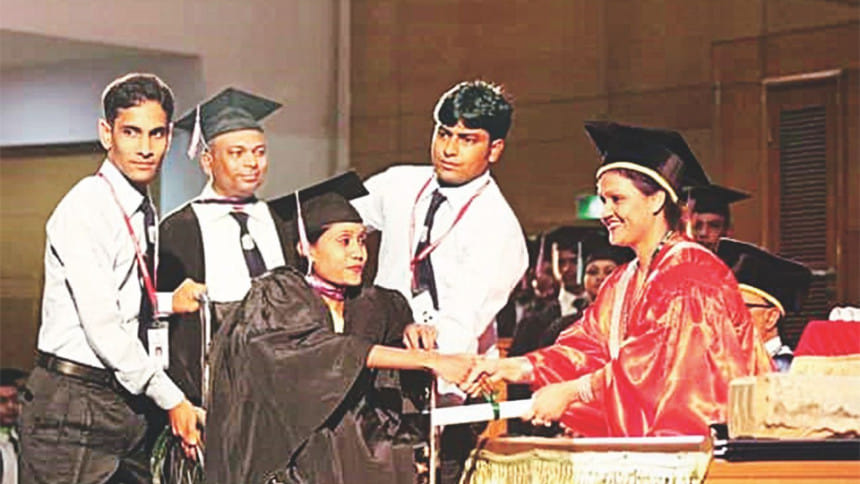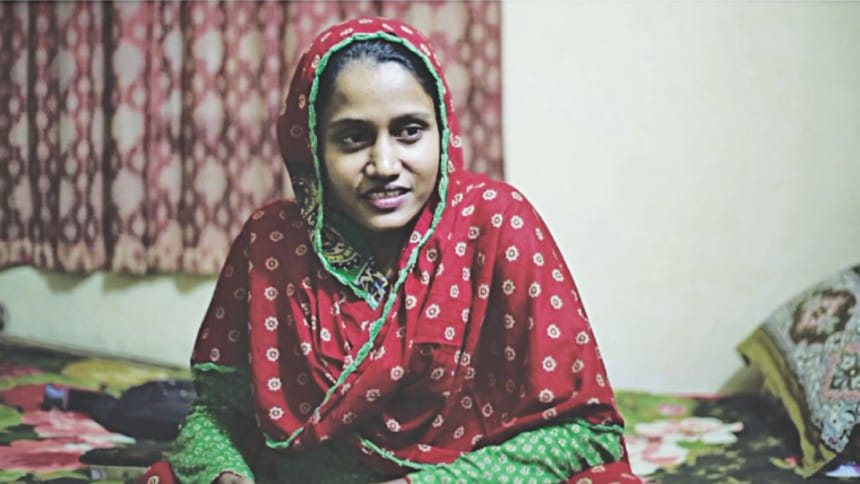Nasima's Crusade

The road winds through a maze of groceries and workshops in a neighbourhood that offers a visitor none of the attributes associated with its name—Rajabari (or royal palace). It's actually North Rajabari, a suburb under Turag thana, which was carved out of Uttara in Dhaka only a little over a decade ago. A quick glance around will reveal that this neighbourhood, once a village that grew rice, is fast changing into a chaotic town of the kind that now surrounds the capital, with unplanned, shabby structures, but if you look closely, you may still find traces of the seductive trappings of its rural past: a close-knit community, clusters of single-family dwellings, dirt patches beneath your feet, loud music from a nearby CD shop, gusty winds from the river, or what's left of it anyway.
But it is this small, seemingly unremarkable place where lives an extraordinary person. Meet Nasima Akter, a disabled girl whose courage and determination in the face of the insurmountable challenges of her life can inspire millions of people with disabilities in Bangladesh.
"Poor Disabled Girl"—Nasima's condition may read like an identity label but it also makes her one of the most vulnerable among the disabled, who form about 10 percent of the country's population. Yet, Nasima has lived up to challenges that would have weighed down any person of lesser strength. She stood up when no one expected her to, and drew strength from sources that no one knew existed.
Nasima Akter was born like any healthy infant in 1988. The oldest of the family's six children, she was full of life and quickly learned to roll over and crawl. By the time she had taken her first steps, she was hardly nine months. It was a little after her first birthday when tragedy struck her. Young Nasima was affected by polio virus which left her with high fever, and bedridden. Things got worse when the fever refused to go even after a few months. She developed stiffness in her back and neck which eventually spread to other parts of the body.

She had contracted paralytic polio—a fact that her family didn't know until much later. Paralytic polio is a disease that destroys motor neurons and weakens the central nervous system of a patient causing muscle weakness, loss of reflexes, and eventually partial or total paralysis of their limbs.
Nasima's poor family tried everything within their capacity to cure her. Though her fever subsided gradually, no one had the least idea about what could get her on feet again. After general physicians failed to do anything about it, a traditional healer known as Dewan Fakir was roped in to help her. Fakir applied some bizarre methods like spraying lemon juice all over her body and having her stand half-buried in the earth.
Throughout her preteen years, she was taken from one doctor to another, putting a tremendous strain on the family's finances, but to little effect. Although eventually she regained strength in the upper part of her body, the lower part remains totally paralysed.
"I was too young to process the reality of what was going on," said Nasima, after we sat down in her room just a stone's throw from her father's roadside grocery store. "It was painful to watch everyone go about their life while I was tied to a bed. As days went by, I found it harder and harder to accept that I would never be able to walk again or have a normal life."
Life, for Nasima, stopped before it began in any meaningful way. But deep in her little heart, she somehow realised that giving up was no solution. She started going to school with two younger siblings. In her first grade, she performed exceptionally well, surprising everyone who until then saw in her little more than a jumble of fragile bones and shrivelled limbs. It was a rude awakening for the poor, superstitious neighbourhood.
Nasima stood first in all the exams until her eighth grade. Then she got admitted in class nine at the locally reputed Kamarpara School and College, and two years later in 2003, secured a brilliant result in her SSC examination for which she received an award from eminent lawyer-politician Dr Kamal Hossain. In 2005, when she appeared in her HSC exams from Uttara Ideal College, she was the top-grader in her class. This brought her another award from the hand of renowned nuclear scientist Dr M Shamsher Ali.
All these little moments of success and encouragement made life less unbearable for Nasima. Her winning streak continued at the tertiary level also. She graduated in BBA from Uttara University in 2010, finishing as a top-grader. The result brought her two awards: the Departmental Chairperson's Award (for all-round performance) and a Magna Cum Laude (for academic excellence). In her MBA from Southeast University, she again passed with flying colours.
Her odds with physical mobility contrasted the development of her intellect. Her extraordinary academic feat, however, was not a miracle. Hard work, an ability to process troubling emotions, relentless struggle with poverty, tremendous will power and determination to pursue her dream, and a curiosity to go beyond the obvious made her a fighter who wouldn't give up easily.
Even the way she walks is evidence of her inner strength. She cannot walk like everyone else. She cannot use a wheelchair either because her feeble hands cannot steer the wheels for long nor are the neighbourhood streets good enough for wheelchair users. The only way left for her is to manually propel her body forward with the help of her bare hands while still in a sitting position. It makes an unforgettable sight when Nasima walks in this way. Such is her resolve that she had never considered staying away from class for once.
"The only thing I could do to stop myself from going crazy is to immerse myself in my studies. It was the only thing that gave me a sense of purpose, something to hold on to in the midst of all my challenges," said Nasima.
There were, however, occasions when she wished she had found a way to spare herself the uphill problems in her life. People's condescending attitude, suggestive comments and name-calling have always tormented her. "These made me feel as if I am some kind of an eyesore. There were times when I felt utterly helpless," said Nasima. "I've learned to accept my disability long ago but I don't understand why people still can't."
Before she moved to Uttara University, she was denied admission in a well-known private university, because of her physical condition. Even her family was sceptical about the need for her education at times. Financial constraints aside, they couldn't understand what an education can do for a disabled girl. Nasima recalls her father complaining, "How long (will your study continue)? Will it take an eternity?"
So she had to give an extra dose of effort to prove that she was not just a disabled girl. Throughout her student life, she received waivers on her education, not because she was disabled but because she earned them with her performance.
She, however, had support from some people along the way. One of them was Kazi Tareq Ullah, an associate professor of business administration formerly associated with Uttara University. "Tareq Sir has been like a father who cared as much for me as for his own children," she said. Another was advocate Abdul Baten, an influential community leader of Rajabari, who made her father promise that he would never stop funding her education, especially after her HSC exam when neighbours suggested that she didn't need to study anymore.
Nasima believes people with disabilities do not need mercy but care and attention. Most of them suffer from extreme negligence which serves to destroy whatever degree of confidence they have in themselves. "Even the most challenged of us want to live a normal life. They want to be loved and appreciated. Many disabled persons are not allowed to go out or talk to people. This is not right. They should be allowed to do what makes them happy."
In a country known for its supreme indifference to the plight of people like her—disabled, poor, and female—Nasima is a shining example of defiance although her battle remains as arduous as the day it had first begun.
After failing to secure a job despite repeated attempts since her graduation, Nasima launched an academic institution called Academy of Pedagogy in 2015, where she teaches students of different classes. She earns barely enough to support herself but she hopes to turn it one day into a school where there will be a special focus on the needs of persons with disabilities. "I want to inspire those with disabilities to continue their studies. Many of them leave or drop out of school at an early age. But education is important because it will help them develop necessary skills and give them a fighting chance in life."
"There's no shame in admitting that people like me need support. As well as education, I think there should be proper infrastructure and proper education and employment opportunities for us to live a normal life," she said, adding that often disabled people have trouble going out. "These people cannot even attend job interviews after finishing their degrees, because of people's disparaging attitude, poor road conditions, and insufficient infrastructure which discourage them from going out," she said, citing her own failure to attend a number of interviews.
"There are around 16 million disabled people in Bangladesh. The society still considers them a burden. I think if the proper environment can be created, we all will benefit from it. Then we will have 16 million assets instead of 16 million liabilities."
Badiuzzaman Bay is a member of the editorial team at The Daily Star.
Email: [email protected]





Comments